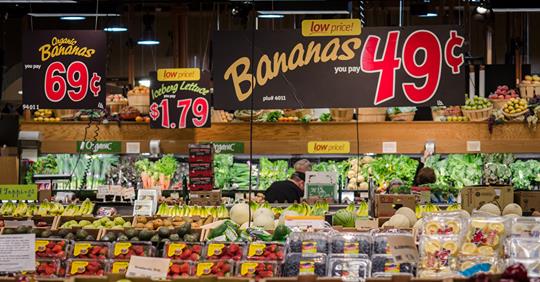Most consumers unwilling to pay more for ‘non-GMO’ or ‘organic’ foods

‘Fresh’ food sells best, or at least foods labeled as such.
According to a newly-released survey of consumer trends, Americans find food and drinks more appealing if they are labeled “fresh” or “farm fresh”. The words “diet” and “vegan” are shopping turn-offs, with around a third of consumers saying those labels make food items less appealing.
The survey of more than 2,200 American adults by research firm Morning Consult found that labels like ‘sourced from American farmers’, ‘nutritious’ and ‘natural flavors’ appealed to at least two-thirds of respondents while ‘fat-free’, ‘sugar-free’, ‘diet’ and ‘vegan’ were the least appealing labels.
The survey also found that American consumers have not been greatly impacted by relentless campaigns against genetically modified foods, which have been shown to be perfectly safe time and time again. While 46 percent of consumers said a ‘non-GMO’ label would make a product more appealing, most consumers aren’t willing to pay more for foods bearing that claim. Just 23 percent of respondents said they would be willing to spend an extra 50 cents on a $5 grocery item if it was labeled GMO-free. The same was true for food and drinks labeled ‘organic’ – 48 percent of respondents found the label appealing but only 23 percent are willing to pay extra.
When presented with a long list of food and drink products, most consumers said the organic label did not have much impact on their shopping choices. There was not a single food item amongst the 15 listed in which a majority of consumers said an organic label mattered ‘a lot’ or ‘some’ and in two thirds of the products, the majority of consumers said an organic label mattered “not much” or “not at all”.
Among younger consumers, however, both ‘organic’ and ‘vegan’ hold greater appeal. Fifty-four percent of respondents between the ages of 18 and 29 said a product bearing an organic label would be more appealing, compared to only 37 percent of those aged 65 and above. For 18 to 21 year olds, 29 percent said a vegan label would make a product more appealing, while just 14 percent of the Baby Boomer generation said the same.
Among the survey’s other findings were that American consumers have yet to fully embrace online grocery shopping and that a vast majority of respondents are satisfied with their local grocery store options. The full report can be read here.


